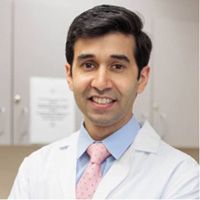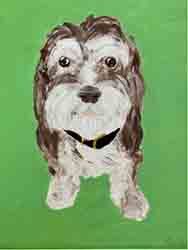Sunil Adige has a golden brain. As a medical oncologist, his analytical side has a deep understanding of
the intricate science behind cancer. As a painter, he sees beauty that others might overlook. Both sides
of his brain work in harmony to make a profound impact on his patients’ lives.

What’s your story?
I always tell people I was born in Dublin and the typical response is, “Ireland?” No, Dublin, Ohio. I lived there long enough to grow midwestern roots. Then my family moved to Connecticut, where some of my closest friendships developed and where I did most of my growing up.
I went to Haverford College, a Quaker school outside of Philadelphia, for biology with a focus on
immunology. After I graduated, I got involved with researching proteins that are involved in HIV transfer. That’s when I became interested in the science behind medicine. At the same time, this work cemented that I missed being connected to people. Combining the science with the people is what led me to medical school.
I thought about going into primary care, but during my rotations I found myself forming these deep relationships with my oncology patients that really fueled my passion. That’s when I knew that this was exactly what I wanted for my career.
What gets you out of bed in the morning?
The first thing that gets me out of bed is my kids. I have two sons — one is three and the other is nine months old. My children and my wife are everything to me. We start the day with hugs, which is the best way to get it going.
My patients motivate and inspire me. They’re amazing. I work in the breast cancer clinic. Our patients are going through very difficult times in their lives, and breast cancer — even when they’re cured — is something that stays with them. I watch them doing whatever it takes to get back to their normal selves. They help each other and ask amazing questions. Every time I go to work, I wonder how they’re going to inspire me that day.
What is that one book that has influenced you the most?
That’s a hard question— there are so many books that have influenced me. But the book that made a huge impact is Once a Runner, by John Parker. I was a competitive runner in high school and college and this is the story of a runner who is on the cusp of making it to the Olympics. For runners, the book is close to poetry, describing that feeling of being on a team and working towards your goal with relentless passion.
There’s a quote that sums it all up — and I’m paraphrasing here — a lot of people come up to the protagonist and ask him what his secret is, how is he so fast? And he doesn’t have the heart to tell them that there is no secret. It’s just the heart-rending process of removing, molecule by molecule, the tough rubber on the bottom of your shoes. It speaks to the idea that there’s no magic trick. You get results by putting in the work, day in and day out.
You and your work have made a difference for many patients. Is there one patient who made a difference for you?
Every patient touches my life in some way. I think about them all the time, when I’m going to bed, when I wake up in the morning. They’re just a part of my life. But there was a patient I worked with for several years who sadly passed away at the beginning of the year. I must have talked to her almost every day. She was young — only 30 — and dealing with metastatic breast cancer. But she made it a point to live her best life every day. I looked forward to seeing her and I miss her a lot. She made a mark on our
entire care team from nurses to social workers and other oncologists. She was part of our family and it was just wonderful to have that time I did with her and her family.

What is the most interesting thing we should know about you?
I love running. You make so many great friends and learn a lot — not just about running but about life in general. Running really is a passion of mine.
I also like to paint, though I don’t have as much time for it now that I have children. Painting is very relaxing and I especially love to paint animals. I’ve painted pet portraits for a lot of my friends and they love receiving them as gifts! It’s much more personal than buying something. When I have more free time, I’d like to get back into it.



